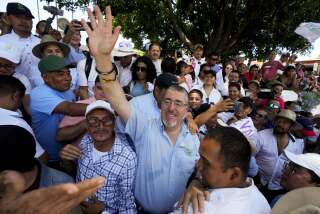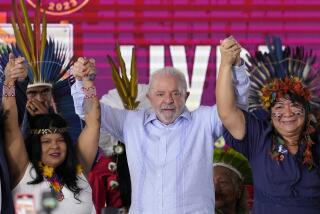PERSPECTIVE ON RUSSIA : We Need Evolution, Not Revolution : Crash programs don’t work, in Russia or elsewhere. It will take years to institutionalize change, as even the Bolsheviks found.
- Share via
MOSCOW — Last year’s aborted putsch triggered the collapse of the old regime. However, the progress of reforms in Russia has not been as remarkable as many people expected when major roadblocks were removed.
For more than six years, Mikhail Gorbachev was endlessly maneuvering, searching for compromises and forming uneasy alliances. He was, probably, the first dedicated evolutionist in Russian history, a leader who did not believe in quick fixes and simple solutions. According to conventional wisdom, Gorbachev failed because he waited too long, was too indecisive and moved too slowly at some critical points.
I doubt that was the case last summer, when Gorbachev moved too rapidly, thus precipitating the putsch. In July, 1991, two major domestic events were to occur--the Soviet republics’ leaders were to initial the completed Union Treaty and the new draft of the party program was to be introduced at the plenary session of the Central Committee. The very coincidence of these events was a bad mistake.
The Union Treaty to be signed in August sounded like a death knell for the upper-echelon bureaucrats in Moscow’s central government. Most of the ministries would have to be disbanded, many bosses would lose their jobs. The KGB even intercepted a conversation between Gorbachev, Russian President Boris Yeltsin and Kazakhstan President Nursultan Nazarbayev, in which they discussed a proposed major reshuffling of key government figures after the signing of the treaty. However, KGB and army chiefs would not have dared to strike without at least tacit support of the Communist Party apparatus, the main power structure.
Only a year before, party apparatchiks were discussing an entirely different draft of the party program, a basically meaningless and unreadable document, written in Soviet newspeak. However, it was very reassuring for the party’s conservative ideologues, who grumbled but did not revolt against Gorbachev and his team. A much more radical draft was prepared secretly within Gorbachev’s inner circle to be presented to the party in autumn, after the Union Treaty signing. But more impatient reformers prevailed, and the Central Committee members were stunned to read a Social Democrat document in which communism itself was not even mentioned. The party apparatus finally realized what was happening and was ready to fight for its own survival.
A coalition of endangered central bureaucrats and frustrated party apparatchiks finally emerged. Last August they attempted to reverse the changes of previous years, but found, to their dismay, that the system was damaged beyond repair with thousands of cuts inflicted by Soviet reformers. As these old-liners went to jail, there were great expectations of landslide reforms in the months to come.
Such optimism was somewhat misplaced. Crash programs of reforms did not work in Russia before, as they hardly did anywhere else. It took many years even for the Bolsheviks to destroy the economic structure they inherited from pre-revolutionary Russia. It will take much more time and patience to rebuild a market-based economy from the shambles of the centrally planned system.
A year later, many people compare President Yeltsin’s problems to those of Gorbachev a year ago. After incredible price hikes earlier this year, the economy only slowly and painfully adjusts itself to market realities, but the level of production and standard of living continue to decline. There is continuing ethnic violence along the borders of Russia and growing crime in Russia itself. Some regions within Russian borders challenge authorities in Moscow with their demands for greater autonomy, if not complete independence.
Basically, the same political forces define the rules of the game in Moscow. The KGB and the army are dissatisfied with the bewildering vulnerability of Russian borders and their own declined prestige. Party apparatchiks still represent the lion’s share of the political elite, and many of them occupy the same offices. Directors and managers of the state-owned enterprises still have almost veto power on major economic decisions and do their best to save often-inefficient and wasteful industries. Production in key sectors of the economy is highly monopolized and privatization is going very slowly.
Nevertheless, there is also a positive side to this rather grim picture. Despite its decline, Yeltsin’s popularity is higher than one could expect under such circumstances. If Gorbachev was perceived as a communist leader--and it was one of his major vulnerabilities--Boris Yeltsin has a new kind of legitimacy as the popularly elected president, combining democratic and moderately nationalistic ideas in his speeches. His peacemaking efforts brought some success in local conflicts in Ossetia and Moldova, and his government in Moscow realizes the inevitability of decentralization of power in Russia in order to preserve its integrity.
It makes Yeltsin’s administration less vulnerable to attacks from his opponents, who can hardly start a new putsch. The old-time economic elite, to be sure, is struggling to protect its interests, but does not challenge reforms in general. These people also realize that they would be better off in a market-based economy, and do not want to return to the past. Party apparatchiks identify themselves with different political parties and institutions, rather than representing a monolithic political force. Even the army and the former KGB do not dream of great revenge, but prefer to hold their moderately improved positions.
In other words, a revolution did not occur last August. Evolutionary development has sped up, but it will still take many years to be completed. Any attempt to escape our problems with a big jump may end up with a new convulsion of the half-transformed system.
More to Read
Sign up for Essential California
The most important California stories and recommendations in your inbox every morning.
You may occasionally receive promotional content from the Los Angeles Times.













